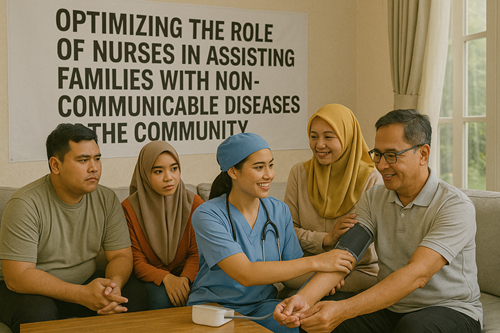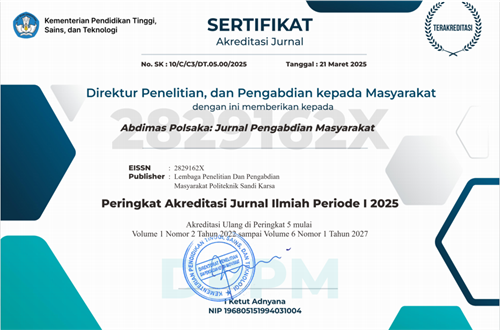Optimizing the role of nurses in assisting families with non-communicable diseases in the community
DOI:
https://doi.org/10.35816/abdimaspolsaka.v4i1.85Keywords:
non-communicable diseases, patient compliance, quality of lifeAbstract
Non-communicable diseases (NCDs) have become a significant health problem in many communities, including in Indonesia. The role of nurses in assisting families with NCDs is crucial to improving the quality of life of patients and their families. This Community Service Program aims to optimize the role of nurses in accompanying families who have members with PTM. The methods used in this program include health training and education, home visits, and the formation of family support groups. Community nurses are provided with training on NCD management, effective communication with patients and families, and holistic mentoring strategies. Home visits are conducted to provide direct assistance and ensure the implementation of the right treatment plan. The establishment of a family support group aims to create a supportive environment for patients and families in dealing with NCDs. The results of this program show an increase in the knowledge and skills of nurses in accompanying families with NCDs. In addition, there has been an increase in patient compliance with treatment plans, as well as an improvement in the quality of life of patients and their families. This program concludes that optimizing the role of nurses in assisting families with NCDs can have a significant positive impact on NCD management in the community.
Downloads
References
Ajeng Wijayanti, L., Hijrah, H., Millati, R., Fredy Saputra, M. K., Suprapto, S., & Tri Wijayanti, Y. (2025). Improving nurse competence in health centers through practice-based training. Jurnal Pengabdian Masyarakat Edukasi Indonesia, 2(1 SE-Articles), 9–16. https://doi.org/10.61099/jpmei.v2i1.64
Awadalla, M. F. M., Yousef, A., Ahmed Shiba, H. A., Humaed Almatani, M. U., Mohammad Ashshi, M. A., Ibrahim Melibari, A. M., Muhsin Alahmadi, A. A., Mohammed Dhahwah, A. F., Ahmah Bukhari, A. M., Mubairik Alharbi, R. A., Mohammed Juraybi, A. M., Ayidh Alraddadi, A. E., & Babateen, O. (2024). Knowledge and response of school teachers towards asthma exacerbation among school children in two arab countries. Clinical Epidemiology and Global Health, 26, 101533. https://doi.org/10.1016/j.cegh.2024.101533
Currie, J., Charalambous, J., Williams, S., Fox, A., & Hollingdrake, O. (2024). A qualitative approach to exploring nurse practitioners’ provision of telehealth services during the COVID-19 pandemic in Australia. Collegian, 31(1), 10–19. https://doi.org/10.1016/j.colegn.2023.10.002
Dermody, G., Wadsworth, D., Dunham, M., Glass, C., & Fritz, R. (2024). Factors Affecting Clinician Readiness to Adopt Smart Home Technology for Remote Health Monitoring: Systematic Review. JMIR Aging, 7. https://doi.org/10.2196/64367
Iqbal, C., Ihsan Kamaruddin, M., Ode Novi Angreni, W., Asmi, A. S., & Muhammad Nur, Q. (2024). Communication, education, and information on non-communicable diseases. Abdimas Polsaka, 3(2 SE-), 67–74. https://doi.org/10.35816/abdimaspolsaka.v3i2.74
Kanyongo, W., & Ezugwu, A. E. (2023). Feature selection and importance of predictors of non-communicable diseases medication adherence from machine learning research perspectives. Informatics in Medicine Unlocked, 38, 101232. https://doi.org/10.1016/j.imu.2023.101232
Li, C., Li, Y., Wang, N., Ge, Z., Wang, J., Ding, B., Bi, Y., Wang, Y., Wang, Y., Peng, Z., Yang, X., Wang, C., & Hong, Z. (2024). Comprehensive modulatory effects of whole grain consumption on immune-mediated inflammation in middle-aged and elderly community residents: A real-world randomized controlled trial. Redox Biology, 76, 103337. https://doi.org/10.1016/j.redox.2024.103337
Lukewich, J., Mathews, M., Poitras, M.-E., Tranmer, J., Martin-Misener, R., Bryant-Lukosius, D., Aubrey-Bassler, K., Klassen, T., Curnew, D., Bulman, D., Leamon, T., & Ryan, D. (2023). Primary care nursing competencies in Canadian undergraduate nursing programs: A national cross-sectional survey. Nurse Education in Practice, 71, 103738. https://doi.org/10.1016/j.nepr.2023.103738
Mulyadi, M. N., & Mubarak, M. Z. S. (2024). Counseling and examination related to the prevention of hypertension and diabetes in the elderly. Abdimas Polsaka, 3(2), 91–99. https://doi.org/10.35816/abdimaspolsaka.v3i2.78
Mulyanti, M., Yulis, D., & Hairuddin, K. (2024). Analysis of social determinants with quality of life in people with HIV/AIDS at the voluntary counseling test clinic. Jurnal Ilmiah Kesehatan Sandi Husada, 13(2 SE-Book Review). https://doi.org/10.35816/jiskh.v13i2.1211
Parry, M., Owadally, T., O’Hara, A., Nickerson, N., & Hart, D. (2024). Community- and Patient-Partner Engagement in Women’s Cardiovascular Disease Research: A Rapid Review of the Evidence. CJC Open, 6(2, Part B), 485–502. https://doi.org/10.1016/j.cjco.2023.12.016
Peter, V. Z., Rea, P., Pillay, M., & Saman, Y. (2024). “Us versus Them”: is the voice of the community heard when planning communication screening programmes for preschoolers? Public Health, 236, 297–306. https://doi.org/10.1016/j.puhe.2024.08.003
Piera-Jiménez, J., Dedeu, T., Pagliari, C., & Trupec, T. (2024). Strengthening primary health care in Europe with digital solutions. Atención Primaria, 56(10), 102904. https://doi.org/10.1016/j.aprim.2024.102904
Semenova, Y., Lim, L., Salpynov, Z., Gaipov, A., & Jakovljevic, M. (2024). Historical evolution of healthcare systems of post-soviet Russia, Belarus, Kazakhstan, Kyrgyzstan, Tajikistan, Turkmenistan, Uzbekistan, Armenia, and Azerbaijan: A scoping review. Heliyon, 10(8), e29550. https://doi.org/10.1016/j.heliyon.2024.e29550
Suprapto, Kamaruddin, M. I., Herlianty, & Nurhanifah, D. (2024). Building Nurse Competency Strategy at Public Health Center in Indonesia: A Descriptive Qualitative Approach. The Malaysian Journal of Nursing, 15(03), 62–70. https://doi.org/10.31674/mjn.2024.v15i03.008
Suranta Ginting, D., Ihsan Kamaruddin, M., & Lontaan, A. (2024). Promotive and preventive education of non-communicable diseases for the community. Jurnal Pengabdian Masyarakat Edukasi Indonesia, 1(2), 56–62. https://doi.org/10.61099/jpmei.v1i2.41
Syaharuddin, S., Wijayanti, Y. T., Kana, M., Suprapto, S., & Napolion, K. (2024). Public health nurses’ caring behaviour can increase homecare patients’ satisfaction. Jurnal Ilmiah Kesehatan Sandi Husada, 13(2), 214–222. https://doi.org/10.35816/jiskh.v13i2.1207
Ten Have, N. J., Ooms, G. I., Waldmann, B., & Reed, T. (2023). Barriers and enablers of community engagement practices for the prevention of snakebite envenoming in South Asia: A qualitative exploratory study. Toxicon: X, 17, 100144. https://doi.org/10.1016/j.toxcx.2022.100144
Yazdani, M., & Haghani, M. (2023). Logistics of patient evacuation in response to disease Outbreaks: Critical considerations for transportation planning. Transportation Research Interdisciplinary Perspectives, 22, 100975. https://doi.org/10.1016/j.trip.2023.100975
Yodsuban, P., Pengpid, S., Amornchai, R., Siripoon, P., Kasemsuk, W., & Buasai, N. (2023). The roles of community health nurses for older adults during the COVID-19 pandemic in Northeastern Thailand: A qualitative study. International Journal of Nursing Sciences, 10(1), 53–63. https://doi.org/10.1016/j.ijnss.2022.12.014

Additional Files
Published
How to Cite
Issue
Section
License
Copyright (c) 2025 Abdimas Polsaka

This work is licensed under a Creative Commons Attribution 4.0 International License.
Most read articles by the same author(s)
- Viyan Septiyana Achmad, Zusana A. Sasarari, Muh Yunus, Efforts To Increase Understanding in Stroke Patients About Range of Motion Exercises , Abdimas Polsaka: Vol. 2 No. 2 (2023): Abdimas Polsaka: Jurnal Pengabdian Masyarakat
- Andi Suyatni Musyrah, Deviarbi Sakke Tira, Nordianiwati Nordianiwati, Lumastari Ajeng Wijayanti, Marisca Jenice Sanaky, Muhammad Dawam Jamil, Health education about hypertension to increase knowledge for senior citizens , Abdimas Polsaka: Vol. 3 No. 1 (2024): Abdimas Polsaka: Jurnal Pengabdian Masyarakat
- Syaharuddin Syaharuddin, Muh Yunus, Suprapto Suprapto, Darmi Arda, Yoga Tri Wijayanti, M. Khalid Fredy Saputra, Providing education for the community to improve nutrition for toddlers , Abdimas Polsaka: Vol. 4 No. 1 (2025): Abdimas Polsaka: Jurnal Pengabdian Masyarakat




















